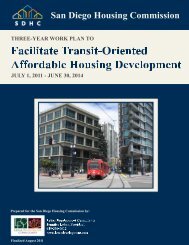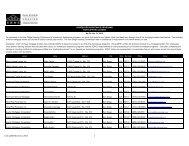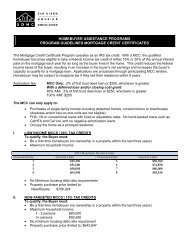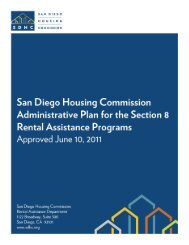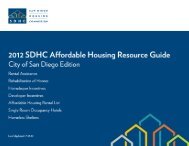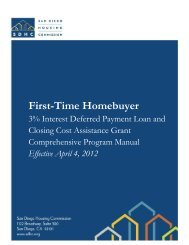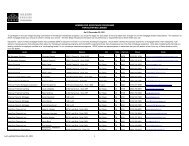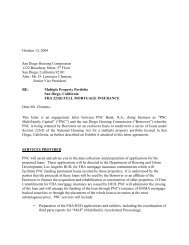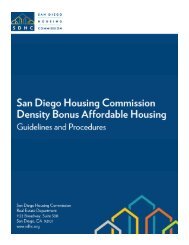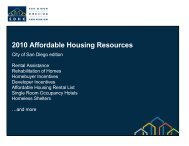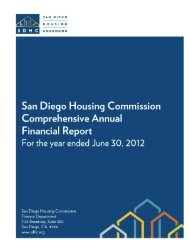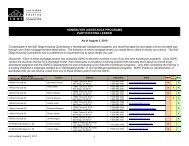Chapter 1 - San Diego Housing Commission
Chapter 1 - San Diego Housing Commission
Chapter 1 - San Diego Housing Commission
You also want an ePaper? Increase the reach of your titles
YUMPU automatically turns print PDFs into web optimized ePapers that Google loves.
<strong>Chapter</strong> 3 – Verification, Income, Assets, and Allowances<br />
[24 CFR Part 5, Subparts D & E; Part 982, Subpart D & L]<br />
- Medical marijuana usage is not allowable as a medical expense<br />
When it is unclear in the HUD rules as to whether or not to allow an item as a medical expense, IRS<br />
Publication 502 will be used as a guide.<br />
Receipts or other record of medical expenses paid by the family during the previous year (appointment<br />
date to appointment date, or in the case of mail-in annual reexaminations, due date to due date) can be used to<br />
anticipate future medical expenses. If an applicant/participant will become entitled to a deduction,<br />
medical expenses will be anticipated based on verifications provided.<br />
SDHC will not duplicate a medical expense that was already allowed during the prior year.<br />
1. Verification of Medical Expenses<br />
Families may only claim medical expenses that have not been and will not be reimbursed by an<br />
outside source. All expense claims will be verified by one or more of the methods listed below:<br />
- Written verification by a doctor, hospital or clinic personnel, dentist, pharmacist, of:<br />
- The anticipated medical costs to be incurred by the family and regular payments due on<br />
medical bills; and<br />
- Extent to which those expenses will be reimbursed by insurance or a government agency;<br />
- Written confirmation by the insurance company or employer of health insurance premiums<br />
paid by the family;<br />
- Written confirmation from the Social Security Administration of Medicare premiums to be<br />
paid by the family over the next 12 months. A computer printout will be accepted;<br />
- Receipts from medical professionals, canceled checks, or pay stubs that verify medical costs<br />
and insurance expenses likely to be incurred in the next 12 months. When using these<br />
receipts to verify medical expenses, receipts must indicate the name of the provider, name of<br />
patient, date of purchase/transaction, service/product provided, and amount paid by patient.<br />
If the receipt comes from an individual, for example a care-provider, the receipt should also<br />
provide the address and phone number as contact information;<br />
- Receipts for non prescription medicines, non-traditional treatments, vitamins and herbal<br />
supplements must be in conjunction with a prescription from a physician for expenses likely to<br />
be incurred in the next 12 months;<br />
- Copies of payment agreements or most recent invoice that verify payments made on<br />
outstanding medical bills that will continue over all or part of the next 12 months;<br />
- Receipts or other record of medical expenses incurred during the past 12 months that can be<br />
used to anticipate future medical expenses. SDHC may use this approach for "general medical<br />
expenses" such as non-prescription drugs and regular visits to doctors or dentists, but not as<br />
reimbursement for one-time expenses from the previous year; or<br />
- Mileage at the IRS rate, or cab, bus fare, or other public transportation cost for verification of<br />
the cost of transportation directly related to medical treatment.<br />
For attendant care:<br />
- A reliable, knowledgeable professional's certification that the assistance of an attendant is<br />
necessary as a medical expense and a projection of the number of hours the care is needed<br />
for calculation purposes; and<br />
3-25



